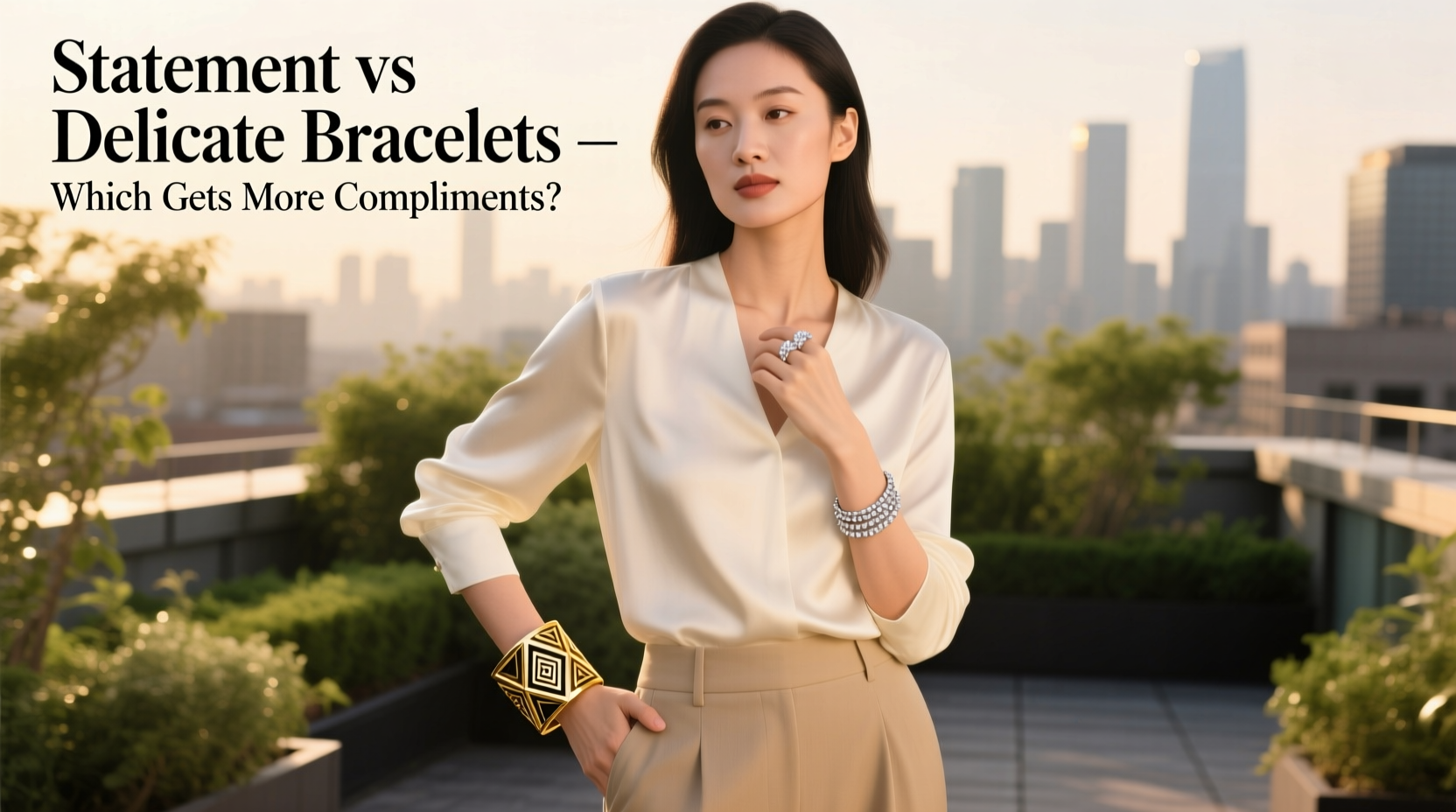When it comes to accessorizing, few choices are as personal—and as visible—as your wristwear. Bracelets sit at the intersection of fashion and function, often catching the eye during conversation, hand gestures, or even a simple coffee hold. But here’s the question many jewelry lovers quietly debate: do bold statement bracelets or minimalist delicate ones attract more genuine compliments?
The answer isn’t as straightforward as “bigger is better” or “less is more.” It depends on context, audience, personal style, and how well the piece aligns with current trends and psychological cues in visual attention. To truly understand what garners more admiration, we need to look beyond aesthetics and into behavior, occasion dynamics, and subtle social signaling.
The Psychology of Attention: Why Some Jewelry Stands Out

Human eyes are naturally drawn to contrast, movement, and novelty. A large, textured cuff or a chunky beaded bracelet creates visual disruption—something our brains register instantly. This makes statement pieces inherently attention-grabbing. They act like punctuation marks in an outfit: bold, definitive, and hard to ignore.
On the flip side, delicate bracelets operate differently. Their appeal lies in subtlety and sophistication. Think of them as whispers rather than declarations. While they may not stop someone mid-conversation, they invite closer inspection. When noticed up close, their craftsmanship, fine details, or sentimental value can spark quiet admiration—often leading to phrases like, “This is so beautiful… where did you get it?”
According to Dr. Lena Moretti, behavioral stylist and author of *The Language of Accessories*, “Compliments aren’t just about visibility—they’re about emotional resonance. A statement piece might get a quick ‘Wow!’ but a delicate chain with a meaningful charm often prompts a deeper reaction because it feels personal.”
“People don’t compliment jewelry they see—they compliment jewelry they feel something about.” — Dr. Lena Moretti, Behavioral Stylist
Comparing Impact: Statement vs Delicate Bracelets
To break this down objectively, let’s compare both styles across key factors that influence how often and why people receive compliments.
| Factor | Statement Bracelets | Delicate Bracelets |
|---|---|---|
| Visibility | High – immediately noticeable from a distance | Low to moderate – requires proximity to appreciate |
| Compliment Speed | Fast – reactions are instant and vocal | Slower – comments come after observation or conversation |
| Type of Compliment | “That’s stunning!” / “Where’d you get that?” | “This is so pretty…” / “It suits you perfectly.” |
| Wearability by Occasion | Better for evenings, events, photoshoots | Everyday wear, office, casual outings |
| Likelihood of Multiple Compliments | One-time reactions per outing | Potential for recurring mentions over time |
| Style Flexibility | Can dominate an outfit; harder to pair | Layerable, adaptable, easy to mix |
As the table shows, neither style wins outright. Statement bracelets win in immediate impact; delicate ones win in sustained elegance and versatility.
Real-World Example: Two Women, Two Styles, One Weekend
Consider Sarah and Mia, friends who attended the same wedding weekend wearing contrasting bracelet choices.
Sarah wore a wide, hammered gold cuff with geometric detailing. At the reception, three different guests said, “I love your bracelet!” within the first hour. One even asked for the brand. The piece was photographed multiple times, including in group shots where her arms were raised with a drink.
Mia wore a thin rose gold chain with a tiny initial pendant. No one mentioned it during dinner. But later, while dancing, a mutual friend leaned in and said, “Your bracelet is so *you*—simple but special.” The next day, two people texted her asking where she got it, having remembered it from photos posted online.
In terms of raw numbers, Sarah got more direct compliments. But Mia’s piece generated more lasting interest and personal connection. Both succeeded—just in different ways.
When Each Style Shines: A Practical Guide
Understanding when to wear each type is crucial to maximizing compliments. Here’s a step-by-step guide based on setting and goal:
- For Parties & Events: Choose a statement bracelet. High lighting, animated gestures, and festive outfits amplify its effect. Pair with a solid-color dress to avoid visual clutter.
- At Work or Professional Settings: Opt for delicate styles. A slim bangle or dainty chain complements business attire without distracting. Colleagues are more likely to notice and comment during one-on-one interactions.
- On Dates or Romantic Outings: Delicate bracelets with sentimental touches (initials, birthstones) encourage intimacy and conversation. They suggest thoughtfulness, not showiness.
- During Travel or Vacations: Layer delicate pieces for beachy elegance, or pack one statement cuff for evening dinners. Sunlight and relaxed clothing make both styles pop differently.
- For Gifting Moments: If giving jewelry, include both—a standout piece for celebration, and a subtle one for daily wear. Recipients will get compliments in different contexts, increasing overall appreciation.
How to Maximize Compliments—Regardless of Style
Ultimately, getting compliments isn’t just about the bracelet—it’s about how you present it. Consider these strategies:
- Confidence matters: Wear your bracelet like it belongs there. Hesitation makes accessories seem out of place.
- Pair intentionally: Avoid clashing metals or overcrowding your wrists. One strong piece often performs better than three competing ones.
- Use contrast: A silver statement cuff stands out against a navy sleeve. A delicate gold chain pops against tanned skin.
- Tell the story: If someone asks about your bracelet, share its origin. Emotional narratives increase perceived value and lead to repeat compliments.
Frequently Asked Questions
Do delicate bracelets get noticed at all?
Absolutely—but in a different way. They’re less likely to draw gasps across a room but more likely to be admired during close interaction. People often remember them later, especially if they carry personal meaning.
Are statement bracelets outdated?
No. While minimalist fashion has trended in recent years, maximalism is resurging. Bold cuffs, mixed metals, and sculptural designs are back in high-end collections. The key is balance: let the bracelet be the star, not the entire show.
Can I wear both at the same time?
Yes, and many do. Try stacking a single statement piece with 1–2 delicate chains for contrast. Just ensure there’s a unifying element—like matching metal tone or theme—to keep the look intentional, not chaotic.
Final Verdict: Which Gets More Compliments?
If you measure compliments by volume and speed, **statement bracelets win**. They command attention and provoke immediate reactions. In social settings, parties, or photo-heavy environments, they’re more likely to generate audible praise.
However, if you define “more compliments” as depth, repetition, and emotional resonance, **delicate bracelets often come out ahead**. They become part of your identity. People remember them. They associate them with your personality. And over time, they mention them again and again.
The most effective approach? Build a balanced collection. Own a few bold pieces for moments that call for drama, and several understated ones for everyday elegance. That way, you’re always prepared to inspire admiration—whether it’s a loud “Wow!” or a soft, sincere, “I love that.”









 浙公网安备
33010002000092号
浙公网安备
33010002000092号 浙B2-20120091-4
浙B2-20120091-4
Comments
No comments yet. Why don't you start the discussion?